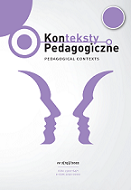Edukacja dzieci i uczniów z cukrzycą typu 1 w przedszkolach i szkołach podstawowych w Republice Czeskiej
Education of children and pupils with type 1 diabetes in kindergartens and primary schools in the Czech Republic
Author(s): Edita SatinskáSubject(s): School education, Educational Psychology, Cognitive Psychology, Health and medicine and law
Published by: Wydawnictwo LIBRON
Keywords: type 1 diabetes; child; pupil; education; supportive measures; medical tasks in education; complications and cognitive deficits in type 1 diabetes (DM 1);
Summary/Abstract: The aim of the paper and the conducted research was to describe the current educational options, educational reality of children and primary school pupils with type 1 diabetes (hereinafter "DM 1") from the perspective of parents (or legal representatives) and to identify possible problematic issues that occur in the educational process of children and pupils with DM 1 in kindergartens and primary schools (school facilities) in the Czech Republic. The education of children with this serious chronic disease poses numerous constraints and requirements, in particular the necessity to change the organisation of teaching; and the question of responsibility for blood sugar monitoring and insulin application, the attitude of school facilities to the admission of children with DM 1 and the general perception of the conditions of education of children with DM 1. This quantitative study presents the data obtained through an electronic online questionnaire distributed to parents of the children in the target group, which was communicated to the parents by registered associations of parents with children diagnosed with DM 1. Based on the results, it can be concluded that the conditions for education and admission of children with DM 1 in the Czech Republic show a number of variability in the experiences of parents in several areas – whether it is the approach to admission of children to school facilities, the use of support measures in the form of counselling services or personal support, while the variability of the experiences of legal representatives is highly polar. They may also entail certain risks for both the educators and children. The understanding of these specificities and raising awareness can help to unify the system and approach in education, thereby eliminating potential discriminatory risks.
Journal: Konteksty Pedagogiczne
- Issue Year: 19/2022
- Issue No: 2
- Page Range: 43-60
- Page Count: 18
- Language: Polish

